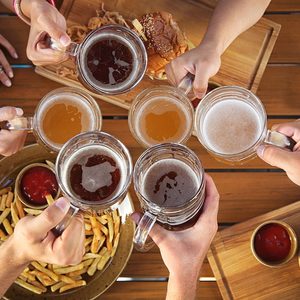This Is What Happens to Your Body When You Binge Drink

Just one night of binge drinking can affect your health. Here's how too much alcohol can affect your body, from head to toes.
When you drink alcohol, does it sometimes get out of hand? Do you set out out to get drunk? Do you keep drinking even though you know you’re impaired? That’s behavior that can be called binge drinking. And it’s more common than you might think.
According to CAMH, about one in three Canadians between ages 20 and 34 and one in five Canadians between ages 35 and 44 years report binge drinking 12 or more times in the past year.
What really happens to your body during and after a bender? A lot, and it might make you think twice about binge drinking, which can be life-threatening when taken to the extreme.
What is binge drinking?
The CDC defines binge drinking as consuming enough alcohol to bring your blood alcohol concentration (BAC) to 0.08 g/dl or above. For men, this typically happens with five or more drinks in two hours and for women, it’s about four or more drinks in that same time frame. Binge drinking doesn’t necessarily mean you’re an alcoholic.
“Binge drinking can occur in as little as one occasion per year on the low end of the scale or it could be someone who drinks a fifth of liquor on two to four weekends a month. There’s a lot of variability,” explains Geoffrey P. Kane, MD, MPH, chief of Addiction Services at the Brattleboro Retreat in Brattleboro, Vermont.
Women seem to be at greater risk than males for health effects of binge drinking. This is likely due to gender differences in how bodies metabolize alcohol, according to the National Institute on Alcohol Abuse and Alcoholism. Research also suggests adolescent brains may be especially vulnerable to damage from binge drinking.
Here’s what happens in your body when you binge drink:
You guzzle down your alcoholic beverage of choice and it is absorbed by the cell membranes lining your gastrointestinal (GI) tract—your mouth, stomach, intestines and other organs that help you digest food. Next stop is your bloodstream and then your heart, where alcohol moves to the lungs and back to the heart to be pumped to all of your organs.
Your blood-brain barrier, composed of specific cells around the brain, is charged with protecting your brain from substances that could be harmful, but it’s no match for alcohol, according to the Alcohol Pharmacology Education Partnership.
Here’s what happens in your body after an alcohol binge.
How alcohol affects your stomach
Drinking large amounts of alcohol over a short period of time can wreak havoc on your gastrointestinal system, says Dean Drosnes, MD, the medical director of the Pennsylvania campus of Caron Treatment Centers in Wernersville.
“Alcohol is really nasty to the gastrointestinal tract and can cause inflammation of the stomach lining and liver which manifests with abdominal pain, usually high in the belly and even low chest pain,” he says. “You can also vomit so vigorously and tear your esophagus and have a life-threatening bleed; or if you are on the verge of an ulcer, alcohol may tip the scale in that direction,” Kane adds.
How alcohol affects your liver
We know that long-term alcohol abuse can lead to serious liver disease. Occasional binge drinking is also harmful to this important detox organ.
“Your liver needs to get rid of fat and alcohol, but getting rid of alcohol is a priority, so fat builds up,” Dr. Kane says, creating serious risk for fatty liver disease.
How alcohol affects your heart
Heart palpitations, including irregular heartbeats, can also occur after a binge-drinking episode, Kane says. “Sedation is followed by rebound or excitation of your central nervous system, which is why you may fall asleep after drinking and then wake up at 2 a.m. and be too agitated to get back to sleep.”
“Holiday heart” is a phenomenon that occurs when people have bouts of atrial fibrillation (AFib) when the alcohol wears off. AFib is the most common type of irregular heart rhythm and dramatically increases risk of stroke. “Research since has confirmed that binge drinking leads to atrial fibrillation, and that it does so even in people who are not regular heavy drinkers,” adds George F. Koob, PhD, director of the National Institute on Alcohol Abuse and Alcoholism (NIAAA).
High blood pressure is a major risk factor for heart attack and stroke, and excessive drinking raises blood pressure, says Dr. Koob.
“Studies suggest that alcohol contributes to a wide range of cardiovascular diseases. For instance, a recent large analysis of data from nearly 600,000 subjects suggested that any alcohol use beyond 100 grams (seven drinks) per week—among both males and females—was associated with an increased risk of stroke, heart failure, fatal hypertensive disease and fatal aortic aneurysm.”
How alcohol affects your kidneys
Your kidneys filter waste and extra fluid from your body, but binge drinking can get in the way of them doing their job, says Aaron White, Ph.D., senior scientific adviser to the NIAAA director. Alcohol reduces the presence of a hormone called vasopressin that helps your kidneys put more water back into circulation in your body.
By suppressing the release of vasopressin, alcohol causes your body to lose more water when you urinate. The resulting mild dehydration might contribute to the misery of alcohol hangovers, White says. And it can worsen existing conditions.
“In patients who already have chronic kidney disease, even one binge-drinking episode per week is associated with faster progression of the disease compared to non-drinkers or moderate drinkers,” says White.
How alcohol affects your brain
All that alcohol goes straight through the blood-brain barrier to your brain, says Dr. Kane. As a result, it can cause difficulty walking, blurred vision, slurred speech, slower reaction times and impaired memory, according to the NIAAA.
“People can be loud and moving around a lot at first, and then they become sedated,” Dr. Kane says of a binge-drinking episode. “You start getting sleepy, experience slurred speech, poor coordination and sometimes can’t walk a straight line,” he says. Seeing double can come with any sedation because the coordination of the eye muscles that move your eyes back and forth becomes sluggish too.
The sedation phase after a binge-drinking episode is a spectrum, he says. “Losing consciousness or passing out is at the end of this spectrum.”
Alcohol affects your central nervous system from the top down, he says. It starts with feeling less sharp and loss of balance and coordination and then the cells that support breathing can become affected, increasing the chances of slowed or stopping breathing altogether. This risk is further heightened if you combine alcohol with prescription or over-the-counter drugs that make you sleepy, he notes.
You could black out when binge drinking, adds Dr. Drosnes. Here’s why: “The rapid increase in the alcohol in your brain’s hippocampus region causes you to stop forming new memories,” he says.
“In blackout, people are walking and talking and doing things but they are not laying down memories,” Kane adds. This risk is heightened when you binge drink on an empty stomach, he says.
And then there are the bed spins, says Dr. Koob. Alcohol disrupts the vestibular system in the inner ear, which normally provides a sense of balance and information about the position of the body relative to the outside world, he says.
“Even mild intoxication with alcohol (0.06% BAC) disrupts the ability of the vestibular system to provide accurate information about a person’s orientation in space.”
How alcohol affects your mood
Many people turn to alcohol to celebrate or boost their mood, but it’s a depressant, says Dr. Drosnes. “Over the long run, repeated binge drinking of alcohol can cause a depression.”
Alcohol overdose poisoning is another possible consequence of binge drinking. This occurs when there is so much alcohol in your bloodstream that areas of the brain controlling basic life functions don’t work anymore. Vomiting is one symptom of alcohol poisoning.
“When you are chugging down alcohol really fast, the reservoir of alcohol in your stomach rises pretty quickly and you can get suddenly sedated, stop breathing and die,” Kane says. Other symptoms include seizures, slow heart rate, clammy skin and lack of a gag reflex, which you need to prevent choking.
How alcohol affects your judgement
Drinking alcohol makes you feel looser and more likely to take risks, Kane adds.”The combination of impaired physical abilities and impaired mental judgment also drives many accidents and accidental deaths,” he says. This includes slips and falls and car accidents.
How alcohol affects your immune system
Our immune system is charged with fending off illness and needs to be up to the task—especially during the Covid-19 pandemic—says Richard A. Grucza, Ph.D, an epidemiologist and professor of family and community medicine at Health & Behavior Research Center at Washington University in St. Louis.
“Even short-term drinking is bad for the immune system as it can disrupt sleep,” he says. “Even one bad night’s sleep makes you more susceptible to viruses and other infectious disease.” Drinking a lot on just one occasion slows your body’s ability to ward off infections for up to 24 hours after the bender, the NIAAA points out.
How alcohol affects your sex life
Although alcohol tends to lower inhibitions and may make it easier to approach a potential partner, binge drinking can affect a man’s ability to achieve an erection, notes the American Academy of Family Physicians.
Binge drinking may also make you less likely use protection, resulting in unplanned pregnancy and sexually transmitted diseases.
Advancing age tends to increase all of these binge drinking risks, says Grucza. “People are getting older and they take more prescription drugs that will add to the effects of alcohol, including clumsiness and cognitive skips.” Muscle mass, bone density and strength decline with age, too. “When you are older you are not quite as strong as you once were when you need to break a fall,” Grucza says.
What is an alcohol use disorder?
Repetitive binge drinking can also pave the way toward alcohol use disorder. About 15 million people in the U.S., or about 6%, have alcohol use disorder, which is characterized by having at least two of 11 different criteria, such as cravings or continuing to drink even when using alcohol is causing trouble with family and friends.
“You need more to get the desired effect, so you increase the amount of alcohol you need to get drunk and start to be unable to function without it and may get withdrawal symptoms such as headaches, nausea, tremors or even seizures,” Grucza says.
If you’re concerned about the amount of alcohol you consume, or your drinking patterns, you can talk to your primary care doctor about your drinking habits or use the NIAAA’s treatment navigator to get support and help finding treatment.







